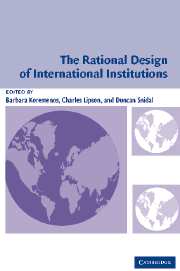Crossref Citations
This Book has been
cited by the following publications. This list is generated based on data provided by Crossref.
Steinwand, Martin C.
and
Stone, Randall W.
2008.
The International Monetary Fund: A review of the recent evidence.
The Review of International Organizations,
Vol. 3,
Issue. 2,
p.
123.
Hall, Peter A.
2009.
Explaining Institutional Change.
p.
204.
2009.
Forced Migration and Global Politics.
p.
185.
Bodea, Cristina
2010.
Exchange Rate Regimes and Independent Central Banks: A Correlated Choice of Imperfectly Credible Institutions.
International Organization,
Vol. 64,
Issue. 3,
p.
411.
Hurd, Ian
2013.
The Legitimacy of International Human Rights Regimes.
p.
165.
Tierney, Michael J.
2015.
Tana Johnson. 2014. Organizational Progeny: Why governments are losing control over the proliferating structures of global governance (Oxford, UK: Oxford University Press).
The Review of International Organizations,
Vol. 10,
Issue. 4,
p.
513.
Oates, John G.
2019.
When delegation fails: the politics of indivisible sovereignty.
Journal of International Relations and Development,
Vol. 22,
Issue. 3,
p.
676.
Darnell, Simon C.
Smith, Tavis
and
Houston, Catherine
2021.
The Palgrave Handbook of Globalization and Sport.
p.
603.
AKTAN, Coşkun Can
2022.
HERESTETİK, RETORİK ve SİYASİ MÜHENDİSLİK Seçime Dayalı Demokrasilerde Siyasal İktidarın Kurumları Ele Geçirmesi ve Devlete Çökmesi: Kamu Tercihi Perspektifi.
Hukuk ve İktisat Araştırmaları Dergisi,
Vol. 14,
Issue. 1,
p.
89.
Huikuri, Tuuli-Anna
2023.
Constraints and incentives in the investment regime: How bargaining power shapes BIT reform.
The Review of International Organizations,
Vol. 18,
Issue. 2,
p.
361.
Millerd, Carly
2023.
Peaceful Conflict Resolution through Densely Gender-Equal International Organizations.
International Interactions,
Vol. 49,
Issue. 6,
p.
845.
Adipudi, Ashok Vardhan
and
Kim, Rakhyun E.
2024.
The latent net effectiveness of institutional complexes: a heuristic model.
Philosophical Transactions of the Royal Society A: Mathematical, Physical and Engineering Sciences,
Vol. 382,
Issue. 2270,
Morin, Jean-Frédéric
Laurens, Noémie
Brandi, Clara
and
Schwab, Jakob
2024.
Using Trade Provisions to Make Environmental Agreements More Dynamic.
International Studies Quarterly,
Vol. 69,
Issue. 1,
Suzuki, Motoshi
2024.
Introduction: The rise of formal institutions in the Asia-Pacific region through competitive regime complexity.
International Relations of the Asia-Pacific,
Vol. 24,
Issue. 3,
p.
367.



